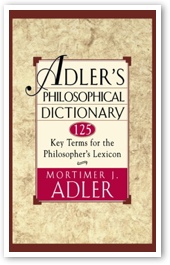Continence and Incontinence
- MORTIMER J. ADLER
We cannot understand what it means to say that man is a rational animal without, at the same time, recognizing that a rational animal is a freak of nature.
 |
The nature of a rational animal is a mixture of incompatible elements.
The animal aspect of human nature motivates us to seek sensual pleasures. The rational aspect controls our conduct by counseling us to desire nothing amiss. In consequence, man is the only living organism in whose nature conflict exists, conflict between the animal and rational aspects of our nature.
Evidence of such a conflict we cannot deny. That we all experience remorse indicates that we often do what we later recognize to be wrong. We also often fail to do what we later recognize we should have done.
Individuals who act as reason dictates and in doing so control their sensual appetites are continent. Truly virtuous persons who have cultivated habits of right desire do not for the most part need to be continent, but even they may be faced with a conflict in their desires that call upon them to be continent rather than incontinent.
Were this not so, individuals would never experience remorse for having done what they ought not to have done or for having failed to do what they ought to have done. (See the entry under Casuistry.) Only saints, persons of heroic virtue, are the exceptions, but it is likewise they who know and can say that there, but for the grace of God, go I.
 This is Meaghen Gonzalez, Editor of CERC. I hope you appreciated this piece. We curate these articles especially for believers like you.
This is Meaghen Gonzalez, Editor of CERC. I hope you appreciated this piece. We curate these articles especially for believers like you.
Please show your appreciation by making a $3 donation. CERC is entirely reader supported.

Acknowledgement
Mortimer J. Adler. "Continence and Incontinence." excerpt from Adler's Philosophical Dictionary: 125 Key Terms for the Philosopher's Lexicon (New York: Touchstone, 1996): 74-75.
Reprinted courtesy of the Center for the Study of Great Ideas.
The Author
Mortimer J. Adler (1902-2001) was chairman and cofounder with Max Weismann of the Center for the Study of The Great Ideas and Editor in Chief of its journal Philosophy is Everybody's Business. He was, in addition, the founder and Director of the Institute for Philosophical Research, Chairman of the Board of Editors of Encyclopaedia Britannica, Editor in Chief of the Great Books of the Western World and The Syntopicon: An Index to the Great Ideas, Editor of The Great Ideas Today (all published by Encyclopaedia Britannica), Co-Founder and Honorary Trustee of The Aspen Institute, past Instructor at Columbia University, and Professor Emeritus at the University of Chicago (1930-52).
Ongoing programs started or developed by Dr. Adler include: The Great Books Foundation (with Robert Hutchins), the Basic Program of Liberal Education for Adults at the University of Chicago (with Robert Hutchins), the Executive Seminars of The Aspen Institute, the Paideia Project (a plan for major reform of public school education), and The Great Ideas seminars at the Center for the Study of The Great Ideas — all promoting liberal education through an understanding of great works of philosophy, literature, history, science, and religion. He was the author of over 50 books, including Adler's Philosophical Dictionary: 125 Key Terms for the Philosopher's Lexicon, How to Read a Book, How to Speak/How to Listen, How to Think About The Great Ideas, and Aristotle for Everybody.
Copyright © 1996 Mortimer Adler



